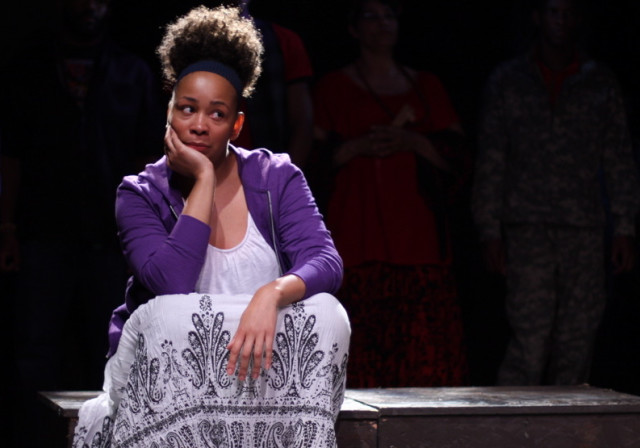Portland Playhouse’s "The Brother/Sister Plays," Part 1

Ramona Lisa glows as Oya. Photo: Christina Riccetti
Oya is a track star who “breathes like the wind,” and runs like it, too. But In the Red and Brown Water, the first play in The Brother/Sister Plays trilogy, she’s not fast enough to outrace her situation: a poor girl in the Louisiana bayou. Instead, she must choose between a track scholarship that might offer escape from her limited future and tending to her dying mother, and then between her burning love for a noncommittal soldier and the steady but staid love of a stuttering mechanic.
The Brother/Sister Plays won its young author, Tarrell Alvin McCraney, incredible accolades, from being called the freshest voice of his generation to the heir apparent of August Wilson (who he studied under), and its clear why in Portland Playhouse’s energetic, lyrical production, nimbly directed by Victor Mack (read our interview with Mack). The writing is poetry—half spiritual, half slang—and the bare staging allows the vibrant emotions of the story—the yearning, the love, the vulnerability, and the heartbreak of these characters confined in their choices—to echo through the audience.
The setting straddles a gritty modern city and the agelessness of myth (the time is identified as “The Distant Present”), and the story itself inhabits a liminal space between realness and ritual. The characters are based on Orishas, the dieties of the Yoruba religion of West Africa. Each enters and exits with his or her own highly stylized movement drawn from Yoruban ceremony (Oya, who is based on the spirit of destruction and change, casts her wrist across her forehead; her virile lover Shango, deity of fire and passion, grinds his hips and pumps his arms), and the ensemble cast forms a chorus that’s equal parts Greek and church, watching the story unfold like ghostly spectators and occasionally coming in with song or chant.
But most striking is the practice of the characters speaking their stage directions out loud. For example, after the character Elegba (named for the Yoruban trickster character) says something stupid to Oya, she says aloud, “Looks at him like: ‘What’d I say?’” before giving him the look and exclaiming, “What’d I say?” While the practice occasionally gets distracting and even tempers the play’s vibrant emotions by sometimes tipping them towards parody, it has the more prominent effect of making a ritual of life—or illuminating the ritual in life. These are motions that we go through, scripts that we read, that imbue a deeper meaning to our actions and a grander narrative to our small lives and simple yet profound problems.
Boston actress Ramona Lisa plays Oya with incredible charisma. She fills the theater with her pain and exuberance and practically glows in the lights of the old church (even when you think she should be wilting). The rest of the cast, a mix of locals with a few imports, is strong, too, and I look forward to watching them develop their characters in the next two plays, The Brothers Size and Marcus, Or the Secret of Sweet, which pick up the stories of some of the other characters and are more narrative than In the Red and Brown Water.
Which brings me to my primary hesitation about the play: supposedly written in a jet-lagged, insomnious state by McCraney, it has a dreamlike quality that is beautiful, but also feels somehow incomplete. Time blurs and exposition is often absent, leaving one questioning the character’s motives and what is actually happening on stage, particularly during a bacchanalian dance club scene that almost felt pulled from a different play. In a way, it felt more like a first act than a complete play (granted, it’s only the first part of the trilogy, but the other parts focus on other characters at other times, not a continuation of Oya’s story). It’s possible that as the actors settle into their roles (after all, they have only had one month to rehearse three plays simultaneously), the production will settle more into a feeling of completion. But it’s also possible that like with the poetry and myth McCraney channels, clarity might occasionally be sacrificed to beauty.
For more about Portland arts, visit PoMo’s Arts & Entertainment Calendar, stream content with an RSS feed, or sign up for our weekly On The Town Newsletter!
